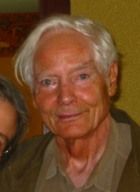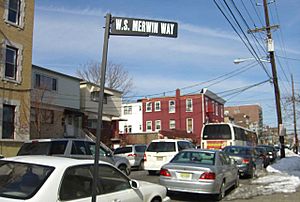W. S. Merwin facts for kids
Quick facts for kids
W. S. Merwin
|
|
|---|---|

Merwin in 2003
|
|
| Born | William Stanley Merwin September 30, 1927 New York City, U.S. |
| Died | March 15, 2019 (aged 91) Haiku, Hawaii, U.S. |
| Occupation | Poet |
| Education | Wyoming Seminary, Kingston, PA 1944; Princeton University (attended) |
| Period | 1952–2019 |
| Genre | Poetry, prose, translation |
| Notable awards | PEN Translation Prize 1969 Pulitzer Prize for Poetry 1971, 2009 Aiken Taylor Award for Modern American Poetry 1990 Lenore Marshall Poetry Prize 1994 Tanning Prize 1994 National Book Award 2005 United States Poet Laureate 2010 Zbigniew Herbert International Literary Award 2013 |
| Spouse | Dorothy Jeanne Ferry Dido Milroy Paula Dunaway (1983–2017) |
| Signature | |
William Stanley Merwin (born September 30, 1927 – died March 15, 2019) was an American poet. He wrote over fifty books of poetry and prose. He also translated many works from other languages.
During the 1960s anti-war movement, Merwin was known for his special way of writing poetry. His poems often had no punctuation. Later, his writing was inspired by Buddhist philosophy and a deep love for nature.
Merwin lived in a rural part of Maui, Hawaii. He wrote a lot and worked hard to restore the island's rainforests.
He received many awards for his writing. These include the Pulitzer Prize for Poetry in 1971 and 2009. He also won the National Book Award for Poetry in 2005. In 2010, the Library of Congress named him the 17th United States Poet Laureate. This is a very important honor for a poet in the U.S.
Contents
Early Life

W. S. Merwin was born in New York City on September 30, 1927. He grew up in Union City, New Jersey. His family moved to Scranton, Pennsylvania in 1936.
As a child, Merwin loved nature. He sometimes talked to a large tree in his backyard. He was also interested in old things, like a building that used to be a barn. When he was five, he started writing hymns for his father, who was a Presbyterian minister.
Career
Early Career: 1952–1976
After attending Princeton University, Merwin moved to Spain in 1952. There, he visited the famous poet Robert Graves. Merwin helped Graves by tutoring his son.
He later moved to London and became friends with poets Sylvia Plath and Ted Hughes. In 1968, Merwin moved to New York City.
From 1956 to 1957, Merwin was a writer at the Poet's Theatre in Cambridge, Massachusetts. He also became a poetry editor for The Nation magazine in 1962.
Besides writing his own poems, Merwin was a skilled translator. He translated works from Spanish, French, Latin, and Italian. He also translated poetry from languages like Sanskrit and Japanese.
Merwin is well-known for his poems about the Vietnam War. He is considered one of the important poets from that time. His early poems often focused on myths or legends. Many of his poems also featured animals.
Later Career: 1977–2019
Merwin's book Migration: New and Selected Poems won the 2005 National Book Award for poetry.
In 1998, he wrote Folding Cliffs: A Narrative. This was a long novel written in verse. It told stories about Hawaiʻi's history and legends.
His book The Shadow of Sirius, published in 2008, won the 2009 Pulitzer Prize for poetry.
In June 2010, the Library of Congress chose Merwin as the seventeenth United States Poet Laureate. He was featured in a 2014 documentary film called Even Though the Whole World Is Burning. Merwin also appeared in the PBS documentary The Buddha in 2010. He had moved to Hawaii in 1976 to study with a Zen Buddhist teacher.
In 2010, Merwin and his wife, Paula, started The Merwin Conservancy. This group works to protect his home and land in Haiku, Maui. He had turned his 18-acre property into a special place for rare palm trees. It is now one of the largest collections of palms in the world.
Merwin's last poetry book, Garden Time, came out in 2016. He wrote it while he was losing his eyesight. When he could no longer see to write, his wife helped him by writing down his poems. This book is about getting older and living in the moment.
In 2017, The Essential W. S. Merwin was published. This book showed his poetry from 1952 to 2016. It also included some of his translations and other writings.
Death
W. S. Merwin lived on land that was once a pineapple farm. It was on the northeast coast of Maui, Hawaii.
He passed away peacefully in his sleep at his home on March 15, 2019. His publisher, Copper Canyon Press, shared the news.
Awards and Honors
Merwin received many important awards for his work:
- 1952: Yale Younger Poets Prize for A Mask for Janus
- 1969: PEN Translation Prize
- 1971: Pulitzer Prize for Poetry for The Carrier of Ladders
- 1979: Bollingen Prize for Poetry
- 1993: The Tanning Prize for his great skill in poetry
- 1993: Lenore Marshall Poetry Prize for Travels
- 2005: National Book Award for Poetry for Migration: New and Selected Poems
- 2009: Pulitzer Prize for Poetry for The Shadow of Sirius
- 2010: United States Poet Laureate
- 2013: Zbigniew Herbert International Literary Award
His hometown also honored him in 2006. A street near his childhood home was renamed W. S. Merwin Way.
Images for kids
 | James Van Der Zee |
 | Alma Thomas |
 | Ellis Wilson |
 | Margaret Taylor-Burroughs |

